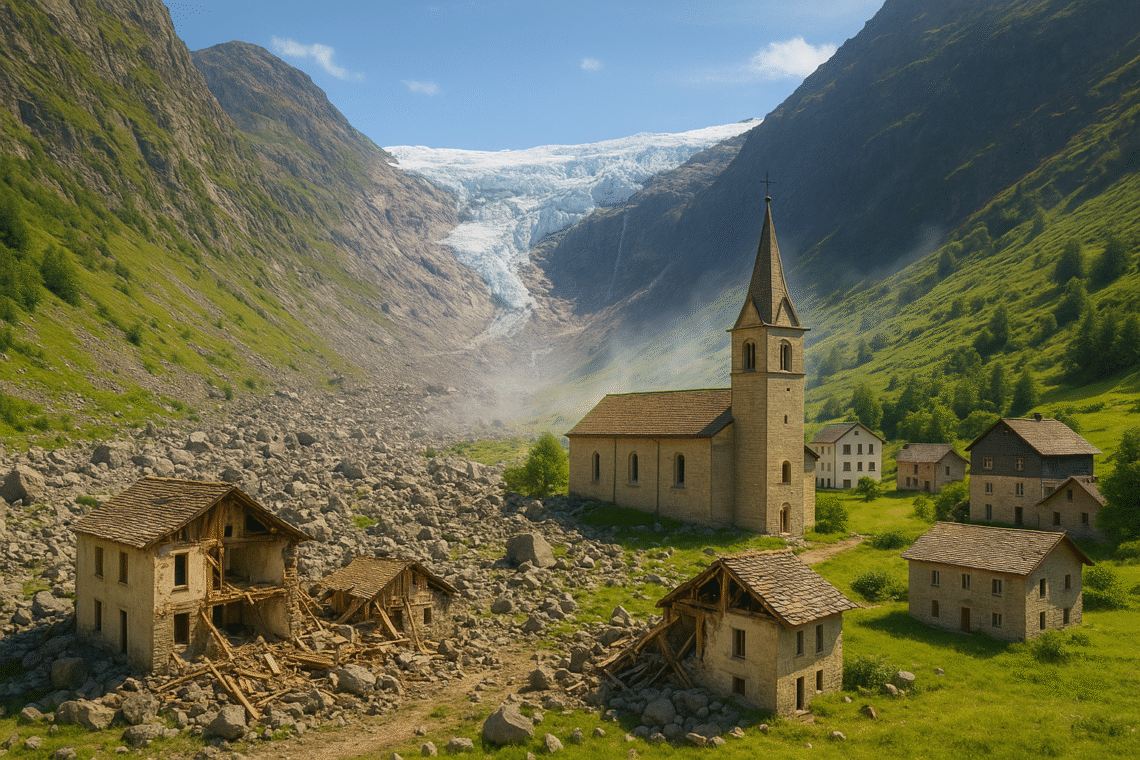It is a strange thing, is it not, to witness the earth move—not in the abstract terms of tectonic theory or glacial drift calculated in centuries, but in the sudden, shuddering collapse of a mountainside, where ancient ice and stone come tumbling down upon the fragile scaffolding of human life? Such was the recent fate of a Swiss village, Blatten, quietly nestled in the alpine folds, now caught in the cold breath of a glacier’s release. The images are haunting: roofs half-buried, a church spire leaning as though bowing to the weight of nature’s final word. And yet, perhaps the greater astonishment is not that the glacier fell—but that the people did not.
This, I find, is the dance—the solemn gavotte between humankind and the environment. For centuries we have built our hearths at the feet of mountains, alongside rivers, beside the sea. We have laid claim to places both beautiful and dangerous, and in so doing, we have entered into a covenant of sorts, albeit one often misunderstood. Nature speaks in long sentences; we tend to interrupt.
But this time, we listened.
It was science, that quiet yet persistent companion of wisdom, that whispered the warning. The movement of the glacier, imperceptible to the eye, was charted with instruments and satellite watchfulness. The mountain’s breath—its exhalation of stress and strain—was heard not by shepherds or pilgrims, but by seismologists and glaciologists who read the ice as one might read the creased face of an aging friend. And because of this, a village emptied itself in time. No lives lost. Hundreds spared. One cannot help but feel, amidst the ruins, a subtle triumph: the triumph of knowledge, of humility before reality, of the curious human spirit that learns to read the signs of the earth rather than conquer it blindly.
There is something deeply poetic in this exchange. The glacier collapses; homes are crushed; but life—human life—flows on. It is not a victory, exactly, for the mountain has made its move. Nor is it a defeat, for the people live, and with life comes the dignity to rebuild. It is, rather, a conversation continued.
Indeed, one might even say the mountain and the village are still in dialogue. What does it mean to live near danger? Is not all of life touched by risk—only cloaked in different garments? Some risks we choose: love, art, the raising of children. Others are chosen for us: a diagnosis, a war, a glacier above our heads. The difference, I think, is whether we respond with fear or reverence.
This recent event in Blatten, Switzerland, seems to me a story not merely of environmental catastrophe, but of philosophical grace. It reveals something essential: that humanity is most noble not when it dominates nature, nor when it retreats from it, but when it listens. The scientists who monitored the glacier were not heroes in the cinematic sense. They were patient. They were precise. They translated the moaning of the mountain into a message—and that message was heeded. Here, we see a kind of wisdom that is often overlooked in our age of rapid proclamations and impatient ambitions: the wisdom of waiting, observing, and acting just in time.
Let us not overlook the profound mercy of foresight. Let us not fail to celebrate the quiet heroism of those who ask the right questions of the earth and dare to listen for its answers. And let us honour the resilience of the villagers, now displaced but not defeated—men and women who will mourn what is lost, no doubt, but who will also find within themselves the ancient instinct to begin again.
The glacier has spoken, and we have not been silenced. That, to me, is a kind of hymn—a song of intelligent reverence. In a world full of noise, where both nature and nations seem so often to erupt with unpredictable force, this moment stands out not only for the calamity avoided but for the possibility revealed: that with enough attention, enough devotion to the truth of things, we may yet learn to live more wisely upon this earth.
And in the quiet that follows, where snow settles over stone and the wind returns to its whisper, perhaps the mountain itself, ancient and indifferent, will grant us one more season of peace.





